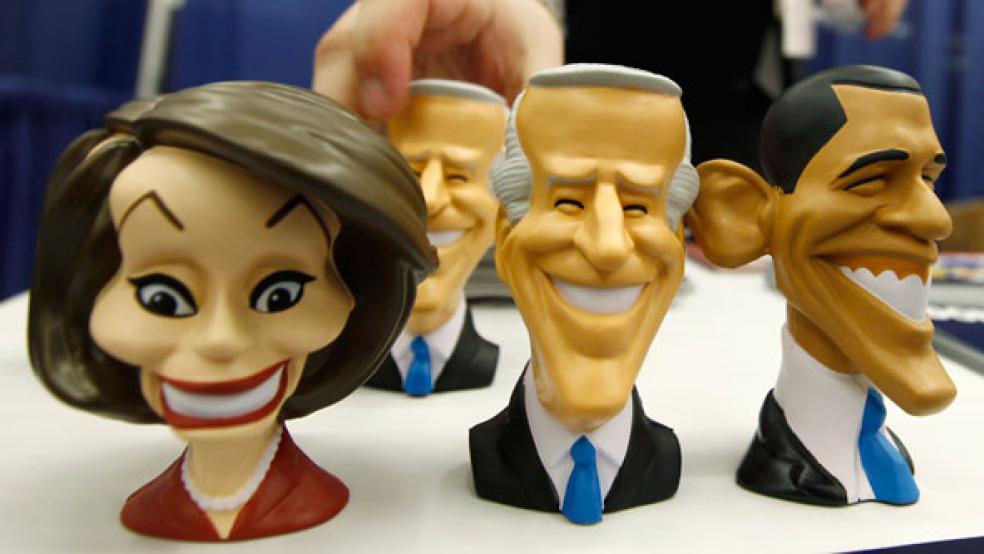Republicans care about converts, not crossover appeal.
This was the big take away from the three-day Conservative Political Action Conference—where GOP all-stars pumped up their fan base late last week at a resort outside Washington, D.C.
There were no calls to compromise with President Obama and Senate Democrats on taxes, the budget deficit, and federal spending. That’s no surprise since the mere gesture of the New Jersey governor hugging the President while touring the devastation left by Superstorm Sandy got Chris Christie removed from the invitation list.
The gridlock of the past three years was less disturbing to attendees than the possibility of more tax hikes by Obama and a budget proposal that only stabilizes the deficit, instead of wiping it out. The GOP response was that the party merely needed to improve their salesmanship on the campaign trail—and swing voters would stop electing Democrats.
“The first think we need to do is stand up for the conservative principles that people in this country elected us to go out and defend,” Rep. Steve Scalise, R-La., told The Fiscal Times. “And then do a better job of articulating not only where we stand but how it helps middle class families – and how it helps getting our economy back on track.”
Former GOP presidential contender Rick Santorum dismissed any thought of compromise with Democrats as a means to winning elections.
“What does it profit the movement to gain a country and lose its own soul?” Santorum asked the crowd. “The left in America and around the world has made that Faustian bargain. For the sake of our movement and our country, we must not.”
The devout conservatives in the audience—most clad in wool suits, a few in colonial britches—agreed with this approach, saying it is important for Republicans to project a united front to voters.
“I don’t think we’re doing anything wrong,” said Synnove Bakke, an office aide for a New Jersey Assemblyman. “It was just the wrong time with Obama coming in and promising everyone socialism and free health care. …But we’re going to get back when they see how much debt we’re going to have and what a fiscal hole we’re going to be in as a country, they’re going to start voting for Republicans again.”
ONE VIEW, ONE VOICE
The strategy to continue the gridlock flies in the face of popular sentiment—and potentially risks economic and political catastrophe.
Obama secured re-election last November in large part by seeking higher taxes on wealthier Americans as a way to maintain spending on education and infrastructure, and avoid deep cuts to Medicare as the program expands.
Republicans counter that the U.S. spends more than every other developed country on education and healthcare but doesn’t get as good or better results. At the same time, approval ratings for the House Republican majority hover in the teens, well below Obama’s popularity.
Because of the partisan infighting, a key consumer confidence index tumbled this month to its lowest reading since December, 2011, the University of Michigan announced Friday.
When explaining the drop-off in the 35-year old index, the university said in a statement, “Never before in the long history of the surveys have so many consumers spontaneously mentioned that the disarray in federal economic policy was the main problem facing the economy.”
But inside the hotel ballrooms at CPAC, such a critical stat went unmentioned.
The adversarial relationship with Obama will likely become even more tense in the months ahead, judging by what was said from the podium and in the hallways.
GOP lawmakers are smarting from the fiscal cliff deal earlier this year that led to a tax rate increase on household incomes above $450,000, and elimination of tax breaks for couples making $250,000 or more. They intend to block any additional attempts to raise taxes by Obama as part of his plan that would stabilize the national debt, but—again—not generate a budget surplus.
House Budget Committee Chairman Paul Ryan, the former Republican vice presidential nominee, described the president’s philosophy as immoral. His budget proposal would in theory balance the budget in 10 years.
“A debt crisis would be more than an economic event—it would be a moral failure,” the Wisconsin congressman said in his CPAC speech. “By living beyond our means, the government is sending a message. It’s saying, ‘if you plan ahead—if you make sacrifices for your kids—if you save—you’re a sucker.’ It’s brazenly stealing from our children. And it has to stop.”
Senate Minority Leader Mitch McConnell, R-Ky., pledged to keep fighting to defund Obamacare, the 2010 law that provides near-universal health insurance.
CRACKS APPEAR IN THE DEBT CEILING
Kansas Rep. Tim Huelskamp went a step further by suggesting that any increase in the debt ceiling—set to be breached in May—might hinge on the president agreeing to defund his namesake achievement. Without an increase in the debt ceiling, the government would default on its loans, a historic first that could cause chaos in the financial markets. Huelskamp downplayed the chance of a default, even if the country maxes out its borrowing authority under the assumption the government would continue to pay its creditors.
The resistance to compromise did not mean that the GOP has become set in its ways. Kentucky Sen. Rand Paul excited CPAC on Thursday by saying that the cozy relationship some Republicans have enjoyed with Wall Street was a betrayal of their values. His message led to him narrowly winning the CPAC straw poll over Florida Senator Marco Rubio.
The Republican freshman—whose father is former Texas Rep. Ron Paul—impressed the crowd by calling for a federal government that returns to its 18th Century roots.
“There is nothing conservative about bailing out Wall Street,” Paul said. The Republican Party has to change—by going forward to the classical and timeless ideas enshrined in our Constitution. When we understand that power corrupts and absolute power corrupts absolutely, then we will become the dominant national party again.”





